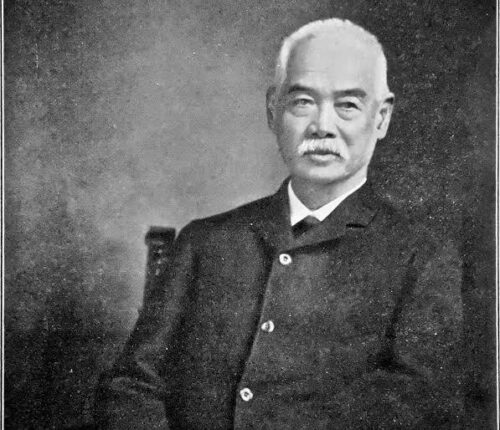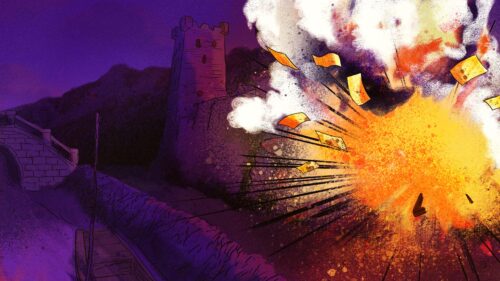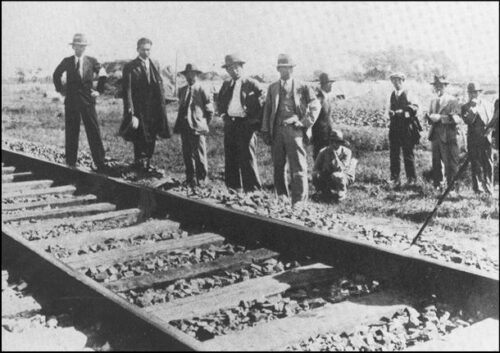This Week in China’s History: August 2, 713
Previously on This Week in China’s History…
Wǔ Zétiān 武则天 is best known as the most powerful woman in China’s long imperial history, ruling as emperor of the Zhou, or “Wu Zhou,” Dynasty from 690 to 705, after serving as empress regent for two of her sons and effectively running the show during much of the reign of her husband. In all, Wu Zetian exercised formal or informal power over China for more than 40 years.
After she relinquished the throne in 705, a few months before her death, Wu Zetian left behind a court riven with factionalism. In particular, two women built political support at court: Empress Wei, the daughter of Emperor Zhongzong, who had ambitions to rule in her own name; and Wu Zetian’s only surviving daughter, Princess Taiping. Biding her time, Princess Taiping allied with her brother and nephew; when the emperor died in 710, they led a coup that resulted in Princess Taiping becoming the power behind the throne, formally held by her brother, Emperor Ruizong. The stage appeared set for the daughter to succeed her mother (with a short gap): an unprecedented transfer of power from woman to woman in China’s court.
But that was last week…this week in China’s history is about another coup, two years later, that ends our two-part story.

Princess Taiping was not emperor, but she ruled China. As Richard Guisso wrote in the Cambridge History, “[Her] minions were insinuated into the highest of state offices, and [the Emperor Ruizong] refused even to consider any measure she had not first approved.” He went on, quoting the Comprehensive Mirror for Aiding Government: “Whatever she wished, the Emperor granted. From the chief ministers down, appointment and dismissal hung on one word from her…The most powerful people in the land flocked to her doorway as if it was the marketplace.”
It needs to be pointed out here that the sources require special scrutiny. Women in positions of power remain rare, and were rarer in the distant past. This was true of “Confucian” China just as it was of societies across the globe. When women did attain power, men often responded by retelling or reinterpreting how that had come to be, often pointing fingers at cruel or ruthless women (sometimes with sinister supernatural help), or at weak or corrupt men. (Or, in at least one case, by trying to rewrite the constitution of Barbieland.)
It’s for that reason that I have omitted many of the details from the biographies of Princess Taiping, as well as her rival Empress Wei and her mother, Wu Zetian. The official histories are stuffed with clickbait, to be sure: incest, treachery, murder — of young children, close relatives, and would-be challengers — and a touch of witchcraft. All of this seems meant to justify keeping women out of politics when the record seems to suggest that, in fact, these women were very good at politics.
Until — like men — they weren’t.
Princess Taiping wielded all but ultimate power in the Tang court. It appeared that it was only a matter of time before she might succeed to the throne itself. As extraordinary as that feat would have been, it was a very ordinary miscalculation that led to her downfall.
Princess Taiping took for granted that her brother, who was both weak and beholden to her for power, would sit on the throne for some time. This was a foolish assumption, given the instability and intrigue that surrounded her at court. Perhaps she was idealizing her mother’s tenure, which lasted for more than four decades, but whatever the case, this assumption led her to overlook the most fundamental concern of any autocrat: succession.
Ruizong named his son, Longji, the future Xuanzong emperor, as heir. This was a logical choice because he had been instrumental in the coup that had brought Ruizong to power and thus demonstrated his competence. But it was this very trait that made him a threat to Princess Taiping. Were Longji to ascend the throne, her plan to rule through — and perhaps eventually usurp — a weak monarch would be jeopardized.
Realizing her mistake too late, Princess Taiping worked to undermine the new crown prince. She used her still-considerable power to have him removed, or short of that, to oppose his allies in the court. It’s rumored that she even turned to poison, unsuccessfully, until eventually she was outmaneuvered by Crown Prince Longji’s allies, and found herself exiled to Shanxi. (It’s no wonder that this era is popular fodder for Chinese costume teledramas.) For two years, power in court shifted away from Princess Taiping, until Longji had her recalled to the capital, the better to monitor her plans.
In 712, Ruizong retired from his position, taking the role of emperor emeritus and installing Longji as the Emperor Xuanzong. Princess Taiping now faced a decision. The influence she had built over decades had given her a network of supporters throughout the civil and military bureaucracy. Her access to the throne now cut off, though, meant that the network was unlikely to last, and at the urging of her supporters she now resorted to the same method that brought her to power in 710: armed insurrection.
The plot was set to launch at the end of July 713, but word leaked to the emperor. Gathering 300 soldiers, he had Princess Taiping’s supporters and allies killed, while the princess herself fled to a temple in the mountains near the capital. When she emerged several days later, she was captured and given the option of execution or suicide. On August 2, 713, she took her own life. So great was the fortune she had amassed in her decades of power that it took three years, according to the official history, to document it all.
The demise of Princess Taiping began the last of the great reigns of the Tang. For nearly 40 years, Xuanzong ruled over the world’s greatest empire, until in the 750s defeat at the Battle of Talas River checked Tang’s westward expansion, followed just a few years later by the An Lushan rebellion and the end of Tang’s Golden Age.
Princess Taiping’s death also marked another change. As the historian Richard Guisso writes, it “may suitably be seen as the end of an era. Never again would so many women, for so long, influence the political life of the Chinese state.”
This Week in China’s History is a weekly column.






